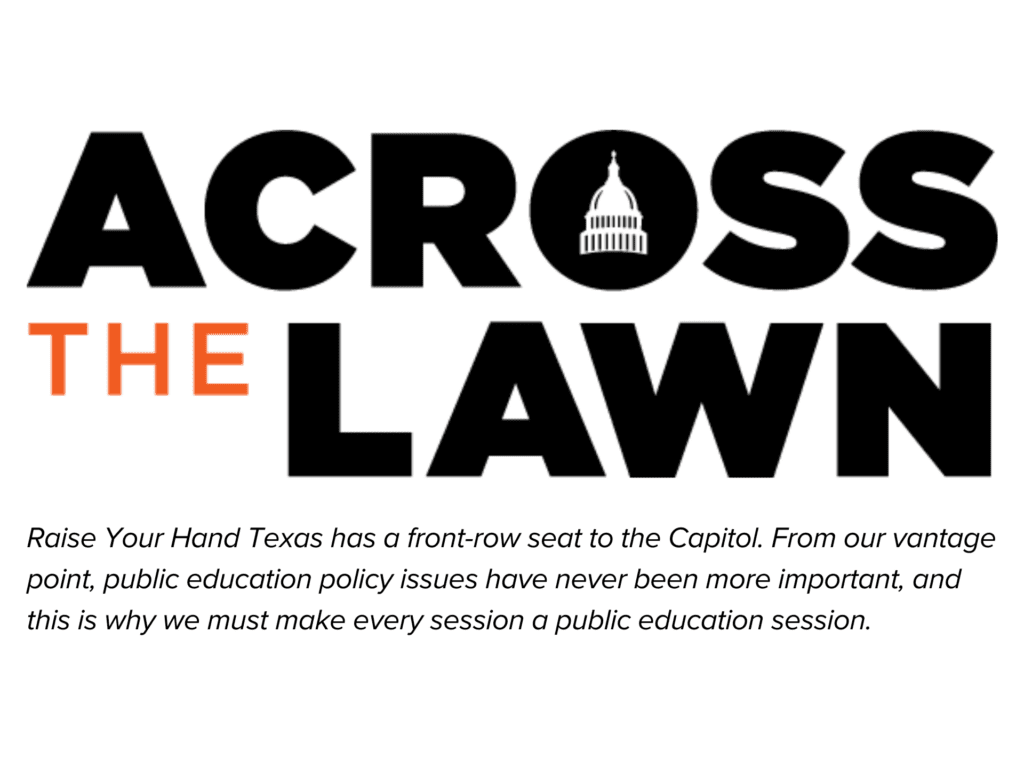
categories
Across the Lawn – September 5, 2025

September 05, 2025

ONE THING TO DO: Read our Statement on the Passage of HB 8
This week, we issued a statement regarding the passage of House Bill 8 (HB 8). Raise Your Hand Texas has maintained for multiple legislative sessions that the core shortcoming of our accountability system is its overreliance on standardized test scores produced by one test on one day.
Read why, ultimately, it will be up to the Legislature to continue monitoring how testing works in our state and to decide if and how Texas can move away from relying solely on standardized tests to evaluate our schools.
1. Legislature Adjourns, Sine Die
The 89th Legislature’s second called special session adjourned late on the night of Wednesday, September 3, after a series of debates, including House Bill 8 (HB 8), the assessment and accountability bill. Lawmakers also advanced bills on a wide range of issues, including congressional redistricting, youth camp safety reforms, supplemental disaster relief funding, abortion drug restrictions, new election law enforcement powers, and property tax exemptions for certain nonprofit organizations.
The proposed ban on consumable THC products did not pass. Lawmakers also failed to reach a compromise on House Bill 17, a property tax transparency bill that would have required school districts and other taxing units to provide more detailed notices linking tax rates to enrollment growth, population change, and inflation.
2. House Bill 8 on Assessment and Accountability Passes After House Concurs with Senate Amendments, 79-47
On Wednesday night, September 3, the House voted to concur with Senate changes to HB 8, creating a new statewide Student Success Tool assessment system set to begin in the 2027–28 school year. The bill requires beginning- and middle-of-year tests from Texas Education Agency (TEA)-approved vendors, though these assessments will not factor into A–F ratings. HB 8 also introduces standalone writing tests, eliminates the English II exam, limits district benchmarks, requires rescoring in some cases, and allows certain national exams and state exams to substitute for end-of-course tests. In addition, it directs TEA to adopt rules earlier and with greater transparency.
Despite these adjustments, the bill leaves the foundation of the A–F accountability system virtually unchanged, with most campuses (elementary and middle school) still rated almost entirely on standardized test scores. HB 8 orders a study of broader indicators such as student engagement, advanced coursework, and parental involvement, but adding these to ratings will require future legislative action. The legislation also directs TEA to develop an annual growth measure, though its role in accountability remains uncertain until lawmakers review a report due no later than the 2029–30 school year.
For students, parents, and teachers, nothing will change over the next two years, and even when the new system begins in 2027–28, the experience may feel similar, though tests are expected to be possibly shorter and with fewer benchmarks throughout the year. Ultimately, it will be up to future legislatures to decide whether Texas can move beyond relying on a single test to define school quality.
3. Attorney General Ken Paxton Issues Statement on School Prayer
On Tuesday, September 2, Attorney General Ken Paxton released a statement encouraging Texas schools to begin the legal process of implementing classroom prayer under Senate Bill 11 (SB 11), which took effect September 1, 2025. The law allows school boards to adopt policies setting aside time for voluntary prayer and the reading of religious texts, with parental consent required for student participation. School boards must take a record vote on whether to adopt such policies within six months.
4. What’s Next?
Thank you for following our weekly newsletter, Across the Lawn, throughout the Second Called Special Session of the 89th Legislature. We appreciate your engagement as we tracked the progress of major education and policy debates. While the Texas Legislature has adjourned, our work does not stop. We will continue to provide updates when significant policy decisions are made that impact Texas public schools. In the months ahead, much of the implementation will shift to TEA, which will develop rules and guidance for districts based on the legislation that passed. We encourage you to follow the TEA website for timely updates on an array of new policy decisions.



